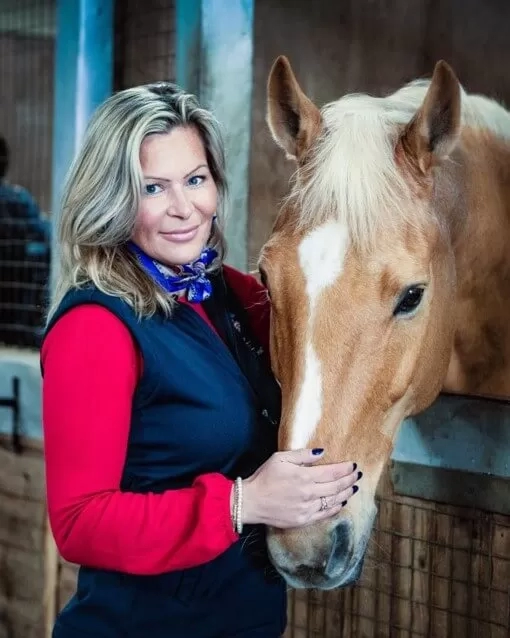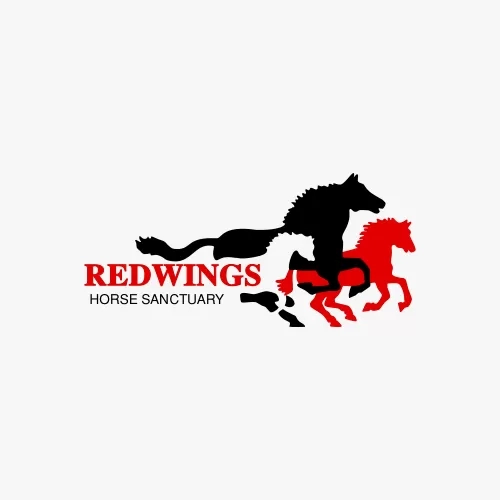21 April 2023

Andrew and Abigail Turnbull (pictured above presenting their Strangles story at the National Equine Forum), alongside their two children Lydia and Henry, purchased Richmond Equestrian Centre (REC) in June 2018, after having a background in farming and running their own haulage firm.
REC hosts two British Eventing Horse Trials a year, as well as British Showjumping and many different unaffiliated events. Tens of thousands of people visit REC annually and it is now a firm favourite equestrian venue in the North-East. There are three separate onsite livery yards, with capacity for around 30 horses and a separate yard for overnight or isolation stays.
In their first year at the centre, Andrew and Abigail spent a lot of time cleaning the livery yards, updating the stables, improving the paddocks and resurfacing the whole of the premises. Alongside this mammoth task they were busy organising the British Eventing Horse Trials in September 2018 and planning ahead for the May 2019 horse trials.
Both of these events were hugely successful and had fantastic feedback. The Turnbulls were looking forward to the year ahead.
However, on 13th August 2019 the bombshell hit. One of their livery horses had tested positive for Strangles. This was just two and a half weeks before their September 2019 British Eventing Horse Trials where there were 850 horses entered to compete, and a huge waiting list. They couldn’t believe it, especially as the horse in question had been on box rest for six months.
To ensure they could get the word about their situation out as widely and quickly as possible, and to pre-empt any rumours or misinformation spreading, the Turnbulls took to social media posting the following:
“IMPORTANT ANNOUNCEMENT
Please be aware that we have a confirmed case of Strangles bacterial infection at Richmond Equestrian Centre affecting one horse.
The horse is in isolation and we are working with the vets to ensure appropriate steps are in place to minimise risks to the wider equine population. This includes reducing horse movement, cancelling commercial bookings and events and ensuring everyone is aware.
We feel it is important to be precautionary, considering our standing within the equine industry, and to minimise risks as much as possible. These actions are likely to be in place until 3rd September 2019.”
They wanted to inform as many people as possible about their situation, the fact that the centre was on ‘lockdown’ and how they were dealing with the outbreak. Their post reached nearly 40,000 people.
At the beginning, all the livery clients were allowed to use their own vets to treat their own horses and there were three different veterinary practices working with them to clear the Strangles from the centre. However, as they all had different approaches to treating the disease it became a little confusing how to move forward.
Andrew and Abigail realised that someone needed to coordinate the effort to ensure that there was a unified approach to dealing with the outbreak. They liaised with all the different practices and then, in consultation with their own vets, decided how to manage the outbreak going forward.
Blood tests were taken the day after the initial outbreak. All positive horses were moved into the ‘Red Yard’, inconclusive horses into the ‘Amber Yard’ and negative horses into the ‘Green Yard’. Every ‘Red Yard' horse was given a guttural pouch procedure, not only to find out if the horses were carriers, but also so the vets were able to directly apply antibiotics onto the affected area, to hopefully ensure the horse recovered as quickly as possible. Most horses needed one or two of these procedures before they were clear, however one of the horses needed nine.
Abigail said: “We passed everything we learnt about Strangles onto our livery clients and began to take and record all the horses’ temperatures at least twice daily. Although there were other symptoms (swollen lymph nodes, loss of appetite and probably most commonly the snotty nose) a rising temperature was our first warning sign! We made a chart to record all the information and it soon became apparent which horses looked to be coming down with the infection.
“A small number of people commented to us that yards that had Strangles never acted this way. They seemed to be implying we were “amateurs” for overreacting and that it would take months to be clear of it.
“Disappointingly, many so-called professionals also told us that we shouldn’t have said anything about the Strangles and kept quiet. These comments seemed absurd, unprofessional and not the way that we wanted to conduct our business. Although we were relatively new to running an equestrian business, we wanted to handle the situation responsibly and professionally. In fact, the negative comments became our motivation to eradicate Strangles our way and to reopen Richmond Equestrian Centre as soon as possible.”
Throughout the outbreak, Andrew and Abigail made it their policy to remain open and honest. They always kept their livery clients and the public aware of all of the facts. They posted regular updates to social media and to the livery client Whatsapp group.
The competition centre remained closed with the livery clients on ‘lockdown’ for seven and a half weeks. Unfortunately, REC’s insurance policy didn’t cover them for Strangles, and neither did the British Eventing insurance policy. Some livery clients whose horses had contracted Strangles were insured, some were not. It was a very costly situation for all involved, and everyone lost out.
Speaking on the impact of the outbreak on the liveries who were stabled there, Abigail added: “Managing the situation was difficult. No one likes to feel controlled or told what to do or how to do things, but we knew we had to be strict. Livery clients were told to come to the centre, tend to their horse, then leave immediately. They couldn’t stop to chat to others, and were forbidden to go into other yards to ensure there was no cross contamination. It was a very difficult time.”
Five out of the 30 horses in the livery yard were infected with Strangles, but thanks to Abigail and Andrew’s efforts, and the cooperation of their livery clients following the rules and strict biosecurity, the infection was contained to those five.
Abigail said: “The Redwings Strangles animation showing how Redwings managed their Strangles outbreak in 2015 was invaluable. It was very easy for people to understand, explaining the seriousness of Strangles, the importance of good biosecurity and that, although it would take time, we could beat it.
“Coupled with the Redwings Strangles information packs (PDF 1.0 MB)we received as part of the Stamp Out Strangles Pledge, we found no better resource to educate all of our customers. It helped people understand why we were doing what we were, and what we hoped to achieve.”
Andrew and Abigail have now tightened up their disease control. All new livery horses have to undergo a clear strangles blood test or guttural pouch procedure before being accepted at Richmond Equestrian Centre. The horse then spends two weeks in the isolation yard upon arrival. When livery clients take horses offsite to another site, they must demonstrate excellent biosecurity.
They also ensure that external service providers – vets, farriers, physiotherapists, dentists, nutritionists etc – a demonstrate good biosecurity too. Andrew and Abigail have worked with Redwings to help devise the Stamp Out Strangles Pledge for Vets and Equine Professionals.
Abigail added: “Predominantly, it is important to us that we speak out about Strangles because a horse can’t. In the equine world, horse welfare is paramount, and the horse should always come first. We feel that, as the owners of Richmond Equestrian Centre, we have a duty of care to the horses, our livery clients and customers.
“Overall, we have gained a lot of respect for being open and honest about our outbreak. Clients and customers have said they trust us more for being responsible and others have commented that they admired the way we handled things properly.
“Being completely free from Strangles in less than eight weeks, with only five horses contracting the disease, also boosted our reputation and showed that our approach was the correct one. This also saw us receive lots of positive feedback on our social media, and everyone was very supportive and kind about how we had handled our outbreak.
“We hope that we have managed to reduce the stigma surrounding Strangles. We certainly learned an awful lot about it, tightened our rules and heightened our biosecurity and we will forever support Redwings Horse Sanctuary in their campaign to Stamp Out Strangles.
“We will never know who, what, why or how Strangles came to stay, but we like to think that we got more out of it than it got out of us and that we turned a negative situation into a positive outcome.”
For more information visit our Strangles hub, with all the practical information you need.
Click here to pledge to Stamp Out Strangles or to become a Strangles Awareness Week Ambassador
Watch Abigail and Andrew speak about their outbreak experience here:
Or, listen to the Strangles Awareness Week podcast:

Redwings Press Office
Find out more about Redwings Press Office

